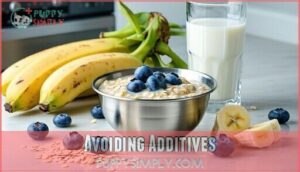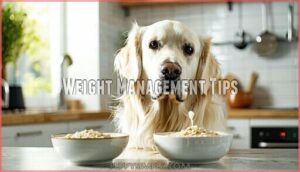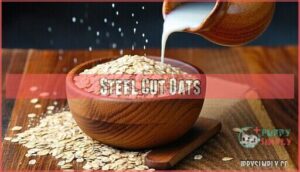This site is supported by our readers. We may earn a commission, at no cost to you, if you purchase through links.
 You shouldn’t feed your dog oatmeal with milk because most dogs can’t properly digest dairy, leading to stomach upset, diarrhea, and uncomfortable gas.
You shouldn’t feed your dog oatmeal with milk because most dogs can’t properly digest dairy, leading to stomach upset, diarrhea, and uncomfortable gas.
While plain oatmeal is actually beneficial for dogs when prepared correctly, milk throws a wrench in the works.
Think of it like giving your lactose-intolerant friend a milkshake – it’s not going to end well.
Instead, cook plain oats with water and let them cool before offering small portions as an occasional treat.
This way, your pup gets all the fiber and nutritional benefits without the digestive drama.
There’s more to know about safe preparation methods and portion sizes.
Table Of Contents
- Key Takeaways
- Oatmeal Nutrition Benefits
- Can Dogs Eat Oatmeal Milk
- Oatmeal Digestive Health
- Skin and Coat Benefits
- Safe Oatmeal Preparation
- Weight Management Tips
- Oatmeal Risks and Precautions
- Feeding Guidelines and Limits
- Choosing The Right Oatmeal
- Consultation and Hydration
- Frequently Asked Questions (FAQs)
- Can dogs eat cooked oatmeal?
- Can dogs eat oatmeal if they are lactose intolerant?
- Can dogs eat oat milk?
- Can anemic dogs eat oatmeal?
- How do I give my Dog oat milk?
- How to make oatmeal dog treats?
- What can I put in my dog’s oatmeal?
- Can my dog eat Quaker oats?
- Will oatmeal help a dog’s upset stomach?
- Can I use human oatmeal on dogs?
- Conclusion
Key Takeaways
- Skip the milk entirely – Most dogs can’t digest lactose properly, which leads to stomach upset, diarrhea, and gas, so you’ll want to cook oatmeal with plain water instead.
- Plain oatmeal is actually beneficial – When you prepare it correctly with water, your dog gets valuable fiber for digestion, B vitamins for a shiny coat, and important minerals without the digestive drama.
- Keep portions small and infrequent – You should only give one tablespoon of cooked oatmeal per 20 pounds of your dog’s body weight, served no more than twice weekly as an occasional treat.
- Avoid all additives and let it cool – Don’t add sugar, butter, artificial sweeteners, or flavored varieties, and always let the oatmeal cool to room temperature before serving to prevent burns.
Oatmeal Nutrition Benefits
When you’re considering oatmeal as a treat for your dog, you’ll be pleased to know it packs impressive nutritional value that can benefit your furry friend’s health.
Your pup deserves this wholesome grain that delivers serious health benefits with every bite.
This whole grain provides essential fiber for digestion, B vitamins for a shiny coat, and important minerals like iron and magnesium, all while being naturally gluten-free and low in fat.
High Fiber Content
Oatmeal’s high fiber content works like a gentle broom for your dog’s digestive system.
This fiber benefits dogs by improving stool consistency and supporting healthy digestion.
The soluble fiber helps regulate blood sugar levels while boosting satiety levels, making your pup feel fuller longer.
These oatmeal benefits dogs seeking weight loss through better digestive health and controlled appetite, promoting overall digestive health.
Low Fat Content
Beyond fiber, oatmeal’s low fat content makes it a smart choice for weight maintenance and pancreatitis prevention in dogs.
With limited calories per serving, it provides satiety benefits without packing on pounds.
This heart health advantage is particularly valuable for overweight pups or those prone to digestive issues.
However, adding milk for dogs changes this equation completely.
Gluten Free Option
When your pup suffers from grain allergies or gluten sensitivity, oatmeal becomes a lifesaver.
Unlike wheat-based products that trigger canine allergies, oats naturally contain no gluten, making them perfect safe grains for sensitive stomachs.
However, watch for cross-contamination during processing. Many commercial gluten-free dog foods include oats as grain alternatives, though lactose intolerance remains a separate concern when adding milk, and ensuring the product is free from gluten is crucial for pups with gluten sensitivity.
Can Dogs Eat Oatmeal Milk
While oatmeal for dogs offers impressive nutritional benefits, adding milk creates complications you’ll want to avoid. Most canines can’t properly digest lactose, making dogs and milk a problematic combination.
When you serve oatmeal with milk, you’re setting up your furry friend for digestive distress including diarrhea, gas, and stomach upset.
The good news? Milk alternatives exist that won’t wreak havoc on your dog’s system. Oat milk for dogs is a suitable alternative to cow’s milk. Plain oat milk without added sweeteners provides a safer option, though water remains the gold standard for cooking oatmeal.
You can still create appealing recipe ideas using dog-safe ingredients like plain pumpkin or blueberries instead of dairy. Remember, dogs eat oatmeal best when it’s prepared simply. The nutritional value stays intact without milk, and the digestion impact remains positive.
Skip the dairy drama and stick with water-based preparations for happy, healthy pups.
Oatmeal Digestive Health
When you’re considering oatmeal for your dog’s digestive health, you’ll find that its high fiber content can work wonders for regulating bowel movements and preventing uncomfortable constipation.
The soluble fiber in oatmeal also supports a healthy gut microbiome, which helps your furry friend process nutrients more effectively and maintain better overall digestive function.
Regulating Bowel Movements
When you’re dealing with your dog’s irregular bathroom habits, oatmeal’s fiber benefits can work wonders for stool consistency.
The soluble fiber helps firm up loose stools, while insoluble fiber adds bulk to promote digestive regularity.
This dual-action approach supports healthy gut motility and overall bowel health.
However, avoid oatmeal for dogs mixed with milk, as lactose can worsen digestive issues.
Preventing Constipation
Fiber sources like oatmeal for dogs work like a gentle broom, sweeping through your pup’s digestive system to prevent dog constipation.
The soluble fiber absorbs water, softening stool consistency while promoting regular elimination.
This natural approach supports canine digestion without harsh medications, and hydration importance can’t be overstated—fresh water helps fiber do its job effectively in maintaining healthy digestive health.
Promoting Gut Microbiome
Beyond keeping things regular, your dog’s gut health depends on a thriving microbiome.
When dogs eat oatmeal, the fiber acts as a prebiotic, feeding beneficial bacteria.
Here’s how oatmeal supports gut health:
- Prebiotic Benefits – Soluble fiber nourishes good bacteria naturally
- Fiber Diversity – Different fiber types promote bacterial variety
- Gut Health – Balanced microbiome improves dog digestion overall
Skin and Coat Benefits
You’ve probably noticed how your dog’s coat looks shinier and feels softer after certain foods, and oatmeal can contribute to this healthy glow through its vitamin B content and omega-6 fatty acids.
These nutrients work together to strengthen your dog’s skin barrier and promote a lustrous coat, while oatmeal’s anti-inflammatory properties help soothe minor skin irritations that might make your pup uncomfortable.
Soothing Itching and Irritation
Colloidal oatmeal works like nature’s skin soother for your furry friend.
Oatmeal baths provide allergy relief by calming irritated patches caused by environmental triggers or hot spots.
This gentle shampoo ingredient reduces inflammation without harsh chemicals.
Many commercial dog skin products harness colloidal benefits because oatmeal’s anti-inflammatory compounds naturally ease discomfort from common canine skincare issues and dog allergies.
Locking in Moisture
Oatmeal emollients work like a protective blanket for your dog’s skin, creating a natural skin barrier that prevents moisture loss.
These hydration methods help lock in essential oils, giving your pup’s coat that healthy shine you’re after.
When you’re considering oatmeal for dogs, remember that proper coat protection comes from these natural moisturizing properties, making oatmeal safe for regular use, utilizing its emollients to achieve the desired effect.
Reducing Inflammation
Anti-inflammatory compounds in oatmeal work like nature’s cooling balm for your dog’s irritated skin.
These powerful elements tackle inflammatory pathways that cause chronic inflammation and joint discomfort.
Here’s how oatmeal reduces inflammation:
- Cytokine reduction calms angry, red patches
- Soothing compounds ease hot spots naturally
- Gentle relief targets dog skin conditions effectively
Your pup deserves this natural comfort.
Safe Oatmeal Preparation
When you’re preparing oatmeal for your dog, you’ll want to cook it with plain water instead of milk, since most dogs can’t properly digest lactose and it might upset their stomach.
Make sure you let the oatmeal cool to room temperature before serving, and skip any tempting add-ins like sugar, butter, or flavored varieties that could harm your furry friend, as they might cause issues due to the inability to properly digest lactose.
Cooking With Water
Water’s your best friend when preparing dog-friendly oatmeal.
Skip milk entirely—many canines can’t digest lactose properly.
Use a 2:1 water ratio for proper texture preference, and cook for 10-15 minutes depending on oat variety.
Steel-cut oats need longer cooking duration than rolled oats.
Plain oats are best for your canine companion.
Monitor water temperature to avoid burning, ensuring your pup gets safe, digestible oatmeal for dogs, with proper texture.
Avoiding Additives
Skip the fancy stuff when preparing oatmeal for dogs. Harmful ingredients like sugar, butter, and artificial sweeteners can turn a healthy treat into a toxic nightmare.
Reading labels becomes your best friend here – avoid anything with xylitol, chocolate chips, or cinnamon flavoring. Plain oatmeal with water offers safe alternatives that meet your dog’s dietary needs without dangerous additives.
Consider healthy oatmeal additions for enhanced flavor and nutrition, which can provide a healthy treat for your dog.
Cooling to Room Temperature
After preparing your plain oatmeal for dogs, preventing burns becomes your next priority.
Hot oatmeal can seriously injure your dog’s mouth and throat.
Let it cool to room temperature – this ideal temperature takes about 10-15 minutes cooling duration.
This waiting period also improves the palatability factor and digestibility impact, making it safer and more enjoyable for canines to eat oatmeal comfortably, which is a key consideration for preventing burns.
Weight Management Tips
If you’re trying to help your pup shed a few pounds, plain oatmeal can be a smart addition to their weight management plan since it’s naturally low in calories but high in fiber that keeps them feeling satisfied longer.
You’ll want to stick to proper portions and avoid adding milk, which packs extra calories your dog doesn’t need when they’re working toward a healthier weight.
This approach will help ensure your dog is getting the nutrients they need while keeping their calorie intake in check, supporting their overall well-being.
Low Calorie Content
Plain oatmeal offers impressive calorie density benefits for your dog’s weight management goals.
This filling fiber powerhouse helps overweight pups feel satisfied without packing on pounds, making it perfect for supporting weight loss efforts.
Here’s why oatmeal’s calorie profile works:
- Low-calorie content keeps portions reasonable
- High fiber creates lasting fullness
- Complex carbs provide steady energy
- Supports balanced diet requirements
The combination of these factors makes oatmeal a valuable tool for weight loss efforts, helping to keep your dog full and satisfied while maintaining a healthy diet.
Portion Control
Successful weight monitoring starts with smart calorie counting and treat limits.
When you’re wondering "can dogs eat oatmeal" or "is oatmeal safe," portion control becomes your best friend.
Match serving sizes to your dog’s activity levels while maintaining balanced meals.
| Dog Weight | Oatmeal Portion | Weekly Frequency |
|---|---|---|
| 10-20 lbs | 1-2 tablespoons | 1-2 times |
| 21-50 lbs | 2-4 tablespoons | 1-2 times |
| 51+ lbs | 4-6 tablespoons | 1-2 times |
Oatmeal Risks and Precautions
While oatmeal offers great benefits for your dog, you’ll need to watch out for several potential risks that could turn this healthy treat into a problem.
Too much fiber can upset your pup’s stomach, milk can cause digestive issues due to lactose intolerance.
Certain additives like xylitol or chocolate can be downright dangerous for dogs.
Excessive Fiber Intake
Overloading your dog’s system with too much fiber can backfire spectacularly.
While oatmeal offers digestive benefits, excessive amounts trigger serious gastrointestinal upset that’ll have you rushing to the vet.
Watch for these fiber overload warning signs:
- Explosive diarrhea that won’t quit
- Persistent vomiting episodes
- Dangerous bloat requiring emergency care
- Severe abdominal pain and discomfort
- Complete loss of appetite lasting days
Lactose Intolerance
Most dogs can’t digest dairy milk properly since they lack sufficient lactase enzymes, making lactose intolerance common in canines.
Most pups can’t handle dairy—their tummies just weren’t built for cow’s milk, making water the smarter choice for oatmeal prep.
When dogs eat oatmeal with milk, digestive symptoms like diarrhea, vomiting, and gas often follow.
Some breeds show higher predisposition to these sensitivities. This is often because adult dogs experience insufficient lactase production, leading to digestive issues.
Consider dairy alternatives like oat milk instead, or try gradual introduction with lactase supplements under veterinary guidance.
Toxic Additives
Many oatmeal varieties contain dangerous dog food additives that’ll turn breakfast into a vet visit.
Xylitol toxicity from artificial sweeteners can cause seizures, while chocolate hazards and raisin dangers pose deadly risks.
Harmful spices like cinnamon or nutmeg aren’t dog-friendly either.
Always check labels for dog food toxins and stick to plain oats with safe ingredients only.
Feeding Guidelines and Limits
When feeding your dog oatmeal, you’ll need to follow specific portion guidelines to prevent digestive upset and maintain their healthy weight.
The general rule is one tablespoon of cooked oatmeal per 20 pounds of your dog’s body weight, served no more than twice weekly as an occasional treat.
Serving Size Recommendations
Getting portion sizes right makes all the difference for your dog’s health.
Feed one tablespoon of cooked oatmeal per 20 pounds of body weight. A 40-pound dog gets two tablespoons max.
Breed considerations matter too – smaller dogs need less, while larger breeds can handle slightly more. Always consider your pup’s activity levels and current weight when determining appropriate portion sizes for ideal dog nutrition. Your dog’s health depends on getting the portion sizes right.
Avoiding Overfeeding
Something as simple as an extra spoonful can tip your dog’s calorie counting off balance.
Reduce treats gradually when adding oatmeal with milk to prevent dog weight gain. Monitor weight weekly and adjust portion sizes accordingly.
For large breeds, it’s important to account for growth sensitivity periods to guarantee proper development.
Your pup’s dog dietary needs require balanced meals, not extras that derail dog nutrition. Remember, moderation keeps tails wagging healthily.
Choosing The Right Oatmeal
When you’re shopping for oatmeal to share with your dog, you’ll find three main types on grocery store shelves: steel-cut oats, rolled oats, and quick oats.
Each variety offers different textures and cooking times, but they’re all safe options when you prepare them properly with water instead of milk.
Steel Cut Oats
Steel-cut oats require longer cooking time than other varieties, creating a chewy texture that’s tougher for canines to digest.
While they offer nutritional superiority with a lower glycemic index, the extended preparation makes them less practical for dog-friendly oatmeal.
Many owners buy chewy steel-cut oats for themselves, and best brands like Bob’s Red Mill work well, but you’ll need extra patience to meet your dog’s dietary needs properly, considering the lower glycemic index.
Rolled Oats
When processing rolled oats for your canine companion, you’ll find this oat variety strikes the perfect balance between nutrition and convenience.
Their moderate cooking time makes them ideal for homemade dog food recipes, while maintaining superior nutritional comparison to instant varieties.
These flattened oats cook thoroughly in water, creating easily digestible oatmeal that supports peak dog health without compromising essential nutrients.
Many owners find chewy rolled oat treats beneficial, which can be a great addition to a dog’s diet for convenience and to support canine health.
Quick Oats
Quick oats undergo extensive processing that reduces nutrient retention compared to steel-cut varieties.
While canines eat oatmeal safely, quick oats present digestibility differences and processing concerns for dog health:
- Higher glycemic index affects blood sugar more rapidly
- Reduced fiber content from heavy processing
- Less sustained energy for active best dog breeds
Choose minimally processed dogfriendly oatmeal over quick oats when serving oatmeal with milk alternatives for ideal canine health.
Some oatmeal varieties also contain added brown sugar which poses health risks.
Consultation and Hydration
Before you start adding oatmeal to your dog’s diet, you’ll want to check with your veterinarian first, especially if your pup has any health conditions or takes medications.
Keep fresh water available at all times, since the fiber in oatmeal can make your dog thirsty, and remember that oatmeal should only complement their regular balanced dog food, not replace it.
Veterinary Advice
Your dog’s health deserves professional guidance when introducing new foods.
Veterinarian advice becomes invaluable for addressing dietary concerns, breed specifics, and portion control aligned with AAFCO standards.
A veterinary consultation helps identify canine dietary restrictions, dog dietary sensitivities, and potential dog gastrointestinal issues before they become problems.
| When to Call Your Vet | What They’ll Assess | Why It Matters |
|---|---|---|
| Before adding oatmeal | Your dog’s health history | Prevents digestive upset |
| After stomach problems | Gastrointestinal symptoms | Guarantees quick recovery |
| For ongoing diet changes | Nutritional balance needs | Maintains peak health |
| When unsure about portions | Weight and activity level | Prevents overfeeding risks |
Fresh Water Importance
Whenever you’re feeding your dog oatmeal with milk or exploring oatmeal benefits for their canine diet, fresh water access becomes essential.
Proper hydration supports kidney function and temperature regulation, especially important when introducing new foods like oatmeal to your dog diet.
Dehydration risks increase with digestive changes, and different breed needs vary for maintaining ideal digestive health.
Balanced Diet Prioritization
Beyond occasional oatmeal treats, your dog’s foundation should rest on a commercial diet meeting AAFCO standards.
Think of treats like dessert—they’re fun but can’t replace the main course.
A balanced diet provides complete canine nutrition, while proper portion control prevents obesity.
Regular vet consultation makes certain your pet nutrition plan supports long-term health, making hydration importance and dog diet balance your top priorities.
Frequently Asked Questions (FAQs)
Can dogs eat cooked oatmeal?
Yes, you can safely feed your dog plain, cooked oatmeal prepared with water.
It’s packed with fiber and nutrients that support digestion.
Just avoid milk, sugar, or flavored varieties that might upset their stomach.
Can dogs eat oatmeal if they are lactose intolerant?
Skip the milk entirely if your dog’s lactose intolerant.
Plain oatmeal cooked with water is perfectly safe and won’t trigger digestive upset.
Your pup will still get all the fiber and nutritional benefits without the tummy trouble.
Can dogs eat oat milk?
Oat milk is generally safer than regular milk for dogs since it’s lactose-free.
However, it still contains calories and potential additives.
Offer small amounts occasionally, but water remains your dog’s best beverage choice, and lactose-free is an important consideration.
Can anemic dogs eat oatmeal?
Anemic dogs can safely eat plain, cooked oatmeal since it contains iron and other nutrients that may support their condition.
However, you’ll want to consult your veterinarian first for proper dietary guidance.
How do I give my Dog oat milk?
Don’t give your dog oat milk directly.
Instead, cook plain oatmeal with water, let it cool, then serve small portions.
Most dogs are lactose intolerant, so milk-based products can cause digestive upset.
How to make oatmeal dog treats?
Think of your kitchen as a doggy bakery waiting to bloom.
Mix one cup plain cooked oatmeal with half a cup flour and one egg.
Form small balls, bake at 350°F for fifteen minutes until golden.
What can I put in my dog’s oatmeal?
You can add plain cooked chicken, pumpkin puree, blueberries, or bananas to your dog’s oatmeal.
Avoid sugar, salt, chocolate, raisins, and artificial sweeteners.
Keep additions simple and dog-safe for maximum nutritional benefit.
Can my dog eat Quaker oats?
Yes, your dog can eat plain Quaker oats when cooked with water.
Skip the instant varieties and avoid any flavored packets.
Cook them thoroughly, let cool, and serve in small portions occasionally.
Will oatmeal help a dog’s upset stomach?
Plain, cooked oatmeal can soothe your dog’s upset stomach thanks to its gentle fiber content that aids digestion.
However, you’ll want to avoid milk since most dogs are lactose intolerant and it’ll worsen stomach issues.
Can I use human oatmeal on dogs?
You can use plain, cooked human oatmeal for dogs, but skip additives like sugar, salt, or flavoring.
Cook it with water only, let it cool completely, and serve small portions occasionally as a treat.
Conclusion
Surprisingly, 65% of adult dogs worldwide are lactose intolerant, making milk a risky addition to their oatmeal.
While you can’t safely give dogs oatmeal with milk, plain water-cooked oats offer excellent nutritional benefits when served properly.
Remember to keep portions small, avoid sugary additives, and always cool the oatmeal before serving.
Your dog’s digestive system will thank you for choosing the safer preparation method. When in doubt about any dietary changes, consult your veterinarian for personalized guidance.
- https://www.akc.org/expert-advice/nutrition/can-dogs-eat-oatmeal
- https://www.petmd.com/dog/nutrition/can-dogs-eat-oatmeal
- https://www.poochandmutt.co.uk/blogs/can-dogs-eat/oats
- https://www.grandmalucys.com/blogs/grandma-lucys-blog/benefits-of-oats-for-dogs
- https://www.healthline.com/nutrition/can-dogs-eat-oatmeal



















